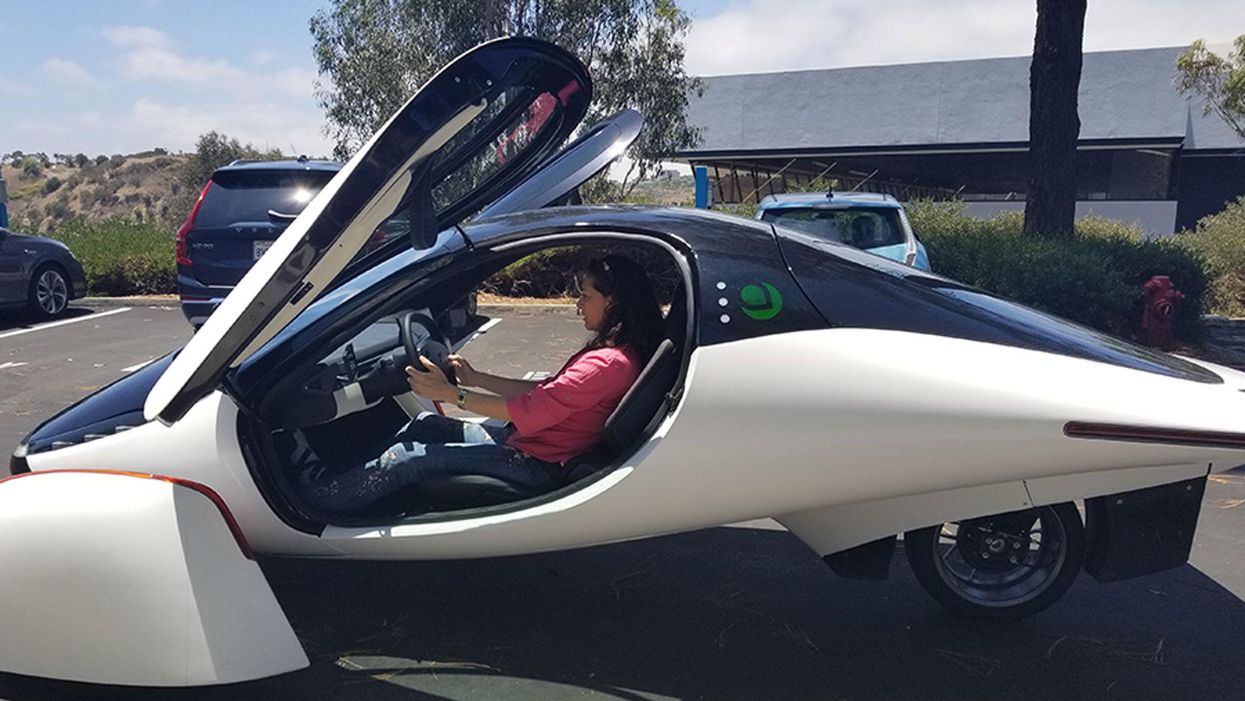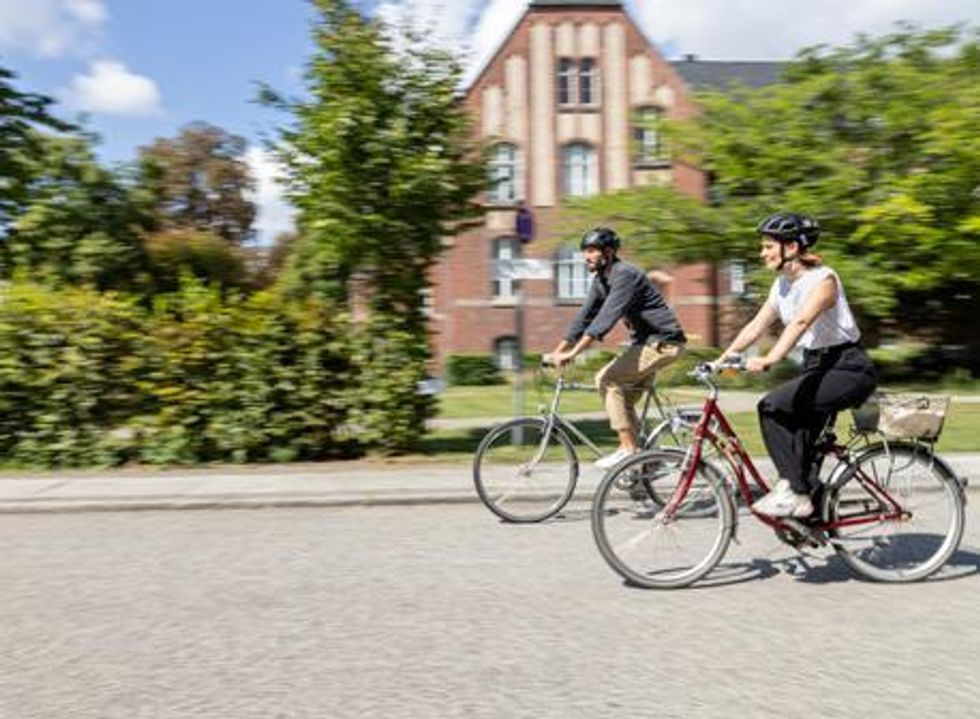The First Mass-Produced Solar Car Is Coming Soon, Sparking Excitement and Uncertainty

Reporter Michaela Haas takes Aptera's Sol car out for a test drive in San Diego, Calif.
The white two-seater car that rolls down the street in the Sorrento Valley of San Diego looks like a futuristic batmobile, with its long aerodynamic tail and curved underbelly. Called 'Sol' (Spanish for "sun"), it runs solely on solar and could be the future of green cars. Its maker, the California startup Aptera, has announced the production of Sol, the world's first mass-produced solar vehicle, by the end of this year. Aptera co-founder Chris Anthony points to the sky as he says, "On this sunny California day, there is ample fuel. You never need to charge the car."
If you live in a sunny state like California or Florida, you might never need to plug in the streamlined Sol because the solar panels recharge while driving and parked. Its 60-mile range is more than the average commuter needs. For cloudy weather, battery packs can be recharged electronically for a range of up to 1,000 miles. The ultra-aerodynamic shape made of lightweight materials such as carbon, Kevlar, and hemp makes the Sol four times more energy-efficient than a Tesla, according to Aptera. "The material is seven times stronger than steel and even survives hail or an angry ex-girlfriend," Anthony promises.
Co-founder Steve Fambro opens the Sol's white doors that fly upwards like wings and I get inside for a test drive. Two dozen square solar panels, each the size of a large square coaster, on the roof, front, and tail power the car. The white interior is spartan; monitors have replaced mirrors and the dashboard. An engineer sits in the driver's seat, hits the pedal, and the low-drag two-seater zooms from 0 to 60 in 3.5 seconds.
It feels like sitting in a race car because the two-seater is so low to the ground but the car is built to go no faster than 100 or 110 mph. The finished car will weigh less than 1,800 pounds, about half of the smallest Tesla. The average car, by comparison, weighs more than double that. "We've built it primarily for energy efficiency," Steve Fambro says, explaining why the Sol has only three wheels. It's technically an "auto-cycle," a hybrid between a motorcycle and a car, but Aptera's designers are also working to design a four-seater.
There has never been a lack of grand visions for the future of the automobile, but until these solar cars actually hit the streets, nobody knows how the promises will hold up.
Transportation is currently the biggest source of greenhouse gases. Developing an efficient solar car that does not burden the grid has been the dream of innovators for decades. Every other year, dozens of innovators race their self-built solar cars 2,000 miles through the Australian desert.
More effective solar panels are finally making the dream mass-compatible, but just like other innovative car ideas, Aptera's vision has been plagued with money problems. Anthony and Fambro were part of the original crew that founded Aptera in 2006 and worked on the first prototype around the same time Tesla built its first roadster, but Aptera went bankrupt in 2011. Anthony and Fambro left a year before the bankruptcy and went on to start other companies. Among other projects, Fambro developed the first USDA organic vertical farm in the United Arab Emirates, and Anthony built a lithium battery company, before the two decided to buy Aptera back. Without a billionaire such as Elon Musk bankrolling the risky process of establishing a whole new car production system from scratch, the huge production costs are almost insurmountable.
But Aptera's founders believe they have found solutions for the entire production process as well as the car design. Most parts of the Sol's body can be made by 3D printers and assembled like a Lego kit. If this makes you think of a toy car, Anthony assures potential buyers that the car aced stress tests and claims it's safer than any vehicle on the market, "because the interior is shaped like an egg and if there is an impact, the pressure gets distributed equally." However, Aptera has yet to release crash test safety data so outside experts cannot evaluate their claims.
Instead of building a huge production facility, Anthony and Fambro envision "micro-factories," each less than 10,000 square feet, where a small crew can assemble cars on demand wherever the orders are highest, be it in California, Canada, or China.
If a part of the Sol breaks, Aptera promises to send replacement parts to any corner of the world within 24 hours, with instructions. So a mechanic in a rural corner in Arkansas or China who never worked on a solar car before simply needs to download the instructions and replace the broken part. At least that's the idea. "The material does not rust nor fatigue," Fambro promises. "You can pass the car onto your grandchildren. When more efficient solar panels hit the market, we simply replace them."
More than 11,000 potential buyers have already signed up; the cheapest model costs around $26,000 USD and Aptera expects the first cars to ship by the end of the year.
Two other solar carmakers are vying for the pole position in the race to be the first to market: The German startup Sono has also announced it will also produce its first solar car by the end of this year. The price tag for the basic model is also around $26,000, but its concept is very different. From the outside, the Sion looks like a conservative minivan for a family; only a closer look reveals that the dark exterior is made of solar panels. Sono, too, nearly went bankrupt a few years ago and was saved through a crowdfunding campaign by enthusiastic fans.
Meanwhile, Norwegian company Lightyear wants to produce a sleek solar-powered luxury sedan by the end of the year, but its price of around $180,000 makes it unaffordable for most buyers.
There has never been a lack of grand visions for the future of the automobile, but until these solar cars actually hit the streets, nobody knows how the promises will hold up. How often will the cars need to be repaired? What happens when snow and ice cover the solar panels? Also, you can't park the car in a garage if you need the sun to charge it.
Critics, including students at the Solar Car team at the University of Michigan, say that mounting solar panels on a moving vehicle will never yield the most efficient results compared to static panels. Also, they are quick to point out that no company has managed to overcome the production hurdles yet. Others in the field also wonder how well the solar panels will actually work.
"It's important to realize that the solar mileage claims by these companies are likely the theoretical best case scenario but in the real world, solar range will be significantly less when you factor in shading, parking in garages, and geographies with lower solar irradiance," says Evan Stumpges, the team coordinator for the American Solar Challenge, a competition in which enthusiasts build and race solar-powered cars. "The encouraging thing is that I have seen videos of real working prototypes for each of these vehicles which is a key accomplishment. That said, I believe the biggest hurdle these companies have yet to face is successfully ramping up to volume production and understanding what their profitability point will be for selling the vehicles once production has stabilized."
Professor Daniel M. Kammen, the founding director of the Renewable and Appropriate Energy Laboratory at the University of California, Berkeley, and one of the world's foremost experts on renewable energy, believes that the technical challenges have been solved, and that solar cars have real advantages over electric vehicles.
"This is the right time to be bullish. Cutting out the charging is a natural solution for long rides," he says. "These vehicles are essentially solar panels and batteries on wheels. These are now record low-cost and can be built from sustainable materials." Apart from Aptera's no-charge technology, he appreciates the move toward no-conflict materials. "Not only is the time ripe but the youth movement is pushing toward conflict-free material and reducing resource waste....A low-cost solar fleet could be really interesting in relieving burden on the grid, or you could easily imagine a city buying a bunch of them and connecting them with mass transit." While he has followed all three new solar companies with interest, he has already ordered an Aptera car for himself, "because it's American and it looks the most different."
After taking a spin in the Sol, it is startling to switch back into a regular four-seater. Rolling out of Aptera's parking lot onto the freeway next to all the oversized gas guzzlers that need to stop every couple of hundreds of miles to fill up, one can't help but think: We've just taken a trip into the future.
Some hospitals are pioneers in ditching plastic, turning green
In the U.S., hospitals generate an estimated 6,000 tons of waste per day. A few clinics are leading the way in transitioning to clean energy sources.
This is part 2 of a three part series on a new generation of doctors leading the charge to make the health care industry more sustainable - for the benefit of their patients and the planet. Read part 1 here and part 3 here.
After graduating from her studies as an engineer, Nora Stroetzel ticked off the top item on her bucket list and traveled the world for a year. She loved remote places like the Indonesian rain forest she reached only by hiking for several days on foot, mountain villages in the Himalayas, and diving at reefs that were only accessible by local fishing boats.
“But no matter how far from civilization I ventured, one thing was already there: plastic,” Stroetzel says. “Plastic that would stay there for centuries, on 12,000 foot peaks and on beaches several hundred miles from the nearest city.” She saw “wild orangutans that could be lured by rustling plastic and hermit crabs that used plastic lids as dwellings instead of shells.”
While traveling she started volunteering for beach cleanups and helped build a recycling station in Indonesia. But the pivotal moment for her came after she returned to her hometown Kiel in Germany. “At the dentist, they gave me a plastic cup to rinse my mouth. I used it for maybe ten seconds before it was tossed out,” Stroetzel says. “That made me really angry.”
She decided to research alternatives for plastic in the medical sector and learned that cups could be reused and easily disinfected. All dentists routinely disinfect their tools anyway and, Stroetzel reasoned, it wouldn’t be too hard to extend that practice to cups.
It's a good example for how often plastic is used unnecessarily in medical practice, she says. The health care sector is the fifth biggest source of pollution and trash in industrialized countries. In the U.S., hospitals generate an estimated 6,000 tons of waste per day, including an average of 400 grams of plastic per patient per day, and this sector produces 8.5 percent of greenhouse gas emissions nationwide.
“Sustainable alternatives exist,” Stroetzel says, “but you have to painstakingly look for them; they are often not offered by the big manufacturers, and all of this takes way too much time [that] medical staff simply does not have during their hectic days.”
When Stroetzel spoke with medical staff in Germany, she found they were often frustrated by all of this waste, especially as they took care to avoid single-use plastic at home. Doctors in other countries share this frustration. In a recent poll, nine out of ten doctors in Germany said they’re aware of the urgency to find sustainable solutions in the health industry but don’t know how to achieve this goal.
After a year of researching more sustainable alternatives, Stroetzel founded a social enterprise startup called POP, short for Practice Without Plastic, together with IT expert Nicolai Niethe, to offer well-researched solutions. “Sustainable alternatives exist,” she says, “but you have to painstakingly look for them; they are often not offered by the big manufacturers, and all of this takes way too much time [that] medical staff simply does not have during their hectic days.”
In addition to reusable dentist cups, other good options for the heath care sector include washable N95 face masks and gloves made from nitrile, which waste less water and energy in their production. But Stroetzel admits that truly making a medical facility more sustainable is a complex task. “This includes negotiating with manufacturers who often package medical materials in double and triple layers of extra plastic.”
While initiatives such as Stroetzel’s provide much needed information, other experts reason that a wholesale rethinking of healthcare is needed. Voluntary action won’t be enough, and government should set the right example. Kari Nadeau, a Stanford physician who has spent 30 years researching the effects of environmental pollution on the immune system, and Kenneth Kizer, the former undersecretary for health in the U.S. Department of Veterans Affairs, wrote in JAMA last year that the medical industry and federal agencies that provide health care should be required to measure and make public their carbon footprints. “Government health systems do not disclose these data (and very rarely do private health care organizations), unlike more than 90% of the Standard & Poor’s top 500 companies and many nongovernment entities," they explained. "This could constitute a substantial step toward better equipping health professionals to confront climate change and other planetary health problems.”
Compared to the U.K., the U.S. healthcare industry lags behind in terms of measuring and managing its carbon footprint, and hospitals are the second highest energy user of any sector in the U.S.
Kizer and Nadeau look to the U.K. National Health Service (NHS), which created a Sustainable Development Unit in 2008 and began that year to conduct assessments of the NHS’s carbon footprint. The NHS also identified its biggest culprits: Of the 2019 footprint, with emissions totaling 25 megatons of carbon dioxide equivalent, 62 percent came from the supply chain, 24 percent from the direct delivery of care, 10 percent from staff commute and patient and visitor travel, and 4 percent from private health and care services commissioned by the NHS. From 1990 to 2019, the NHS has reduced its emission of carbon dioxide equivalents by 26 percent, mostly due to the switch to renewable energy for heat and power. Meanwhile, the NHS has encouraged health clinics in the U.K. to install wind generators or photovoltaics that convert light to electricity -- relatively quick ways to decarbonize buildings in the health sector.
Compared to the U.K., the U.S. healthcare industry lags behind in terms of measuring and managing its carbon footprint, and hospitals are the second highest energy user of any sector in the U.S. “We are already seeing patients with symptoms from climate change, such as worsened respiratory symptoms from increased wildfires and poor air quality in California,” write Thomas B. Newman, a pediatrist at the University of California, San Francisco, and UCSF clinical research coordinator Daisy Valdivieso. “Because of the enormous health threat posed by climate change, health professionals should mobilize support for climate mitigation and adaptation efforts.” They believe “the most direct place to start is to approach the low-lying fruit: reducing healthcare waste and overuse.”
In addition to resulting in waste, the plastic in hospitals ultimately harms patients, who may be even more vulnerable to the effects due to their health conditions. Microplastics have been detected in most humans, and on average, a human ingests five grams of microplastic per week. Newman and Valdivieso refer to the American Board of Internal Medicine's Choosing Wisely program as one of many initiatives that identify and publicize options for “safely doing less” as a strategy to reduce unnecessary healthcare practices, and in turn, reduce cost, resource use, and ultimately reduce medical harm.
A few U.S. clinics are pioneers in transitioning to clean energy sources. In Wisconsin, the nonprofit Gundersen Health network became the first hospital to cut its reliance on petroleum by switching to locally produced green energy in 2015, and it saved $1.2 million per year in the process. Kaiser Permanente eliminated its 800,000 ton carbon footprint through energy efficiency and purchasing carbon offsets, reaching a balance between carbon emissions and removing carbon from the atmosphere in 2020, the first U.S. health system to do so.
Cleveland Clinic has pledged to join Kaiser in becoming carbon neutral by 2027. Realizing that 80 percent of its 2008 carbon emissions came from electricity consumption, the Clinic started switching to renewable energy and installing solar panels, and it has invested in researching recyclable products and packaging. The Clinic’s sustainability report outlines several strategies for producing less waste, such as reusing cases for sterilizing instruments, cutting back on materials that can’t be recycled, and putting pressure on vendors to reduce product packaging.
The Charité Berlin, Europe’s biggest university hospital, has also announced its goal to become carbon neutral. Its sustainability managers have begun to identify the biggest carbon culprits in its operations. “We’ve already reduced CO2 emissions by 21 percent since 2016,” says Simon Batt-Nauerz, the director of infrastructure and sustainability.
The hospital still emits 100,000 tons of CO2 every year, as much as a city with 10,000 residents, but it’s making progress through ride share and bicycle programs for its staff of 20,000 employees, who can get their bikes repaired for free in one of the Charité-operated bike workshops. Another program targets doctors’ and nurses’ scrubs, which cause more than 200 tons of CO2 during manufacturing and cleaning. The staff is currently testing lighter, more sustainable scrubs made from recycled cellulose that is grown regionally and requires 80 percent less land use and 30 percent less water.

The Charité hospital in Berlin still emits 100,000 tons of CO2 every year, but it’s making progress through ride share and bicycle programs for its staff of 20,000 employees.
Wiebke Peitz | Specific to Charité
Anesthesiologist Susanne Koch spearheads sustainability efforts in anesthesiology at the Charité. She says that up to a third of hospital waste comes from surgery rooms. To reduce medical waste, she recommends what she calls the 5 Rs: Reduce, Reuse, Recycle, Rethink, Research. “In medicine, people don’t question the use of plastic because of safety concerns,” she says. “Nobody wants to be sued because something is reused. However, it is possible to reduce plastic and other materials safely.”
For instance, she says, typical surgery kits are single-use and contain more supplies than are actually needed, and the entire kit is routinely thrown out after the surgery. “Up to 20 percent of materials in a surgery room aren’t used but will be discarded,” Koch says. One solution could be smaller kits, she explains, and another would be to recycle the plastic. Another example is breathing tubes. “When they became scarce during the pandemic, studies showed that they can be used seven days instead of 24 hours without increased bacteria load when we change the filters regularly,” Koch says, and wonders, “What else can we reuse?”
In the Netherlands, TU Delft researchers Tim Horeman and Bart van Straten designed a method to melt down the blue polypropylene wrapping paper that keeps medical instruments sterile, so that the material can be turned it into new medical devices. Currently, more than a million kilos of the blue paper are used in Dutch hospitals every year. A growing number of Dutch hospitals are adopting this approach.
Another common practice that’s ripe for improvement is the use of a certain plastic, called PVC, in hospital equipment such as blood bags, tubes and masks. Because of its toxic components, PVC is almost never recycled in the U.S., but University of Michigan researchers Danielle Fagnani and Anne McNeil have discovered a chemical process that can break it down into material that could be incorporated back into production. This could be a step toward a circular economy “that accounts for resource inputs and emissions throughout a product’s life cycle, including extraction of raw materials, manufacturing, transport, use and reuse, and disposal,” as medical experts have proposed. “It’s a failure of humanity to have created these amazing materials which have improved our lives in many ways, but at the same time to be so shortsighted that we didn’t think about what to do with the waste,” McNeil said in a press release.
Susanne Koch puts it more succinctly: “What’s the point if we save patients while killing the planet?”
The Friday Five: A surprising health benefit for people who have kids
In this week's Friday Five, your kids may be stressing you out, but research suggests they're actually protecting a key aspect of your health. Plus, a new device unlocks the heart's secrets, super-ager gene transplants and more.
The Friday Five covers five stories in research that you may have missed this week. There are plenty of controversies and troubling ethical issues in science – and we get into many of them in our online magazine – but this news roundup focuses on scientific creativity and progress to give you a therapeutic dose of inspiration headed into the weekend.
Listen on Apple | Listen on Spotify | Listen on Stitcher | Listen on Amazon | Listen on Google
Here are the promising studies covered in this week's Friday Five:
- Kids stressing you out? They could be protecting your health.
- A new device unlocks the heart's secrets
- Super-ager gene transplants
- Surgeons could 3D print your organs before operations
- A skull cap looks into the brain like an fMRI

